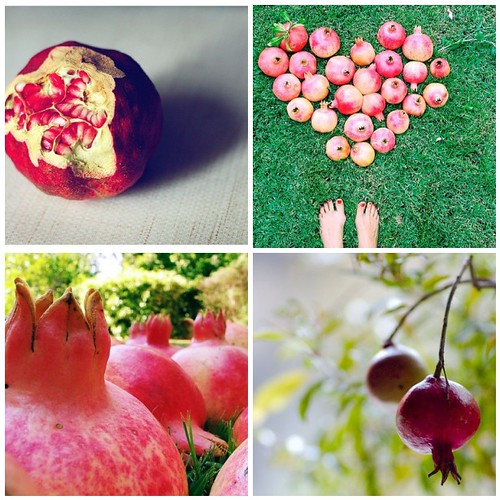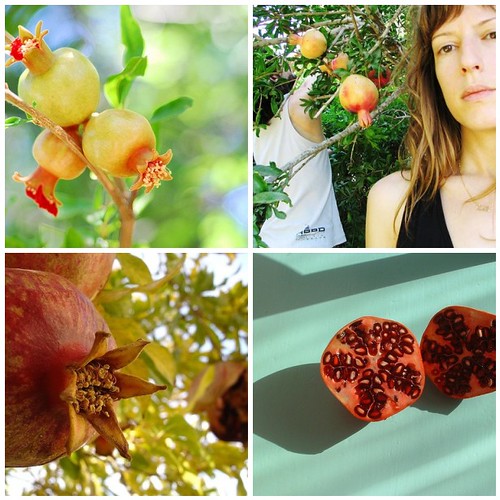Pomegranates: almost completely dispelled from my memory, but here they are again, waiting at the farmer’s market for me to rediscover them. It’s like being snapped awake out of a dream, seeing pomegranates here, bursting apart with their ruby jewel-like seeds. And suddenly I am back to grandma’s house and plucking seeds from pulp so very gingerly. Particularly since I’ve decided I am way too grown up to wear a bib as I eat. (This thought will make Rick laugh. I am the messiest diner there is.) Suddenly I am back in elementary school, listening with rapt attention to the story of Persephone. And feeling how unfortunate it was that she ate those six pomegranate seeds in hell. Damn that fruit and all its seductive power. And I worried: could I ever fall victim to a ruse like that? There is a preciousness and mystery about pomegranates that totally captures my imagination. And a quick Wikipedia search reveals there is much, it turns out, that I don’t know about them. Such as: The fruit of the pomegranate is actually a berry. Also, pomegranate juice has antibacterial properties that may help defend against dental plaque. (I wonder if it’s enough to retire my floss?) Its classical Latin designation is malum (for any of the apple-like fruits -- which is an entirely other, interesting, Garden of Eden-ish line of inquiry) granatum. The granatum part is of particular note. Apparently, according to the Oxford English Dictionary, the word grenade (yep, the weapon) descends from the French for pomegranate: la grenade. (We don't call it that anymore, by the way. Now the pomegranate operates under this moniker: pomum (apple) granatus (seeded) -- just in case anyone's keeping score.)
Other cultural contributions? Well, in Jewish tradition, the pomegranate’s calyx (the flowery end) is said to be the original “design” for the proper crown. Which gets to what what I think is most interesting about the pomegranate: every major religion seems to have a connection to it -- in art and rituals and lore. The legend I find most romantic comes from the Qur'an, which states that pomegranates grow in the gardens of paradise. And so tradition mandates that every seed of the fruit must be eaten, because you can never be sure which of those seeds came directly from paradise.

Exposed Pomegranate :: AMEN and SHANA TOVA y'all
may we all find what we're looking for :: Pomegranate
In Georgia, and Armenia to the east of the Black Sea, there are wild pomegranate groves outside of ancient abandoned settlements.Can’t you see yourself, Frances Mayes-ing a far-away and long-ago villa, and discovering an ancient, wild pomegranate grove in your backyard? Could anything be more perfect, more fairy tale than that? To be suddenly connected to such lushness, such legacy...
And off goes my inner history geek in a gallop. Is it too much to admit that I am tickled to learn pomegranates were introduced to North America by British colonists? That pomegranates were seen as part exotic, part medicinal, and part housewarming? Enough so to warrant transport across the Atlantic and agricultural fussing over? That I am thrilled to know that Thomas Jefferson planted a pomegranate grove at Monticello? Yes? Overboard?
Okay, obviously I am all tangled up in a web of awe and adoration over here. There is so much more to go on about as far as the pomegranate is concerned, of course, but maybe only this much more is best:
"About the pomegranate I must say nothing," whispered the traveler Pausanias in the 2nd century, "for its story is something of a mystery."





No comments:
Post a Comment